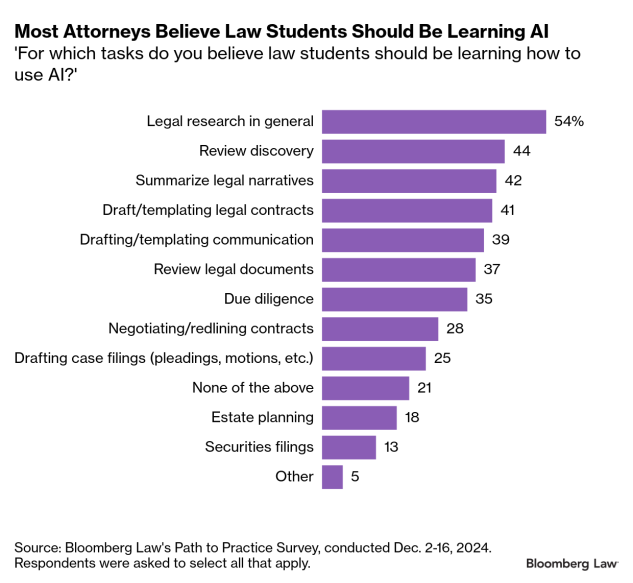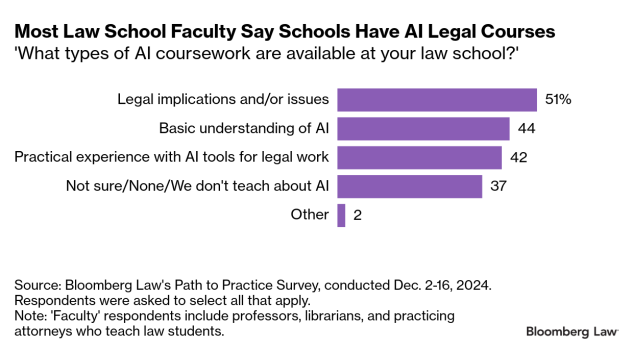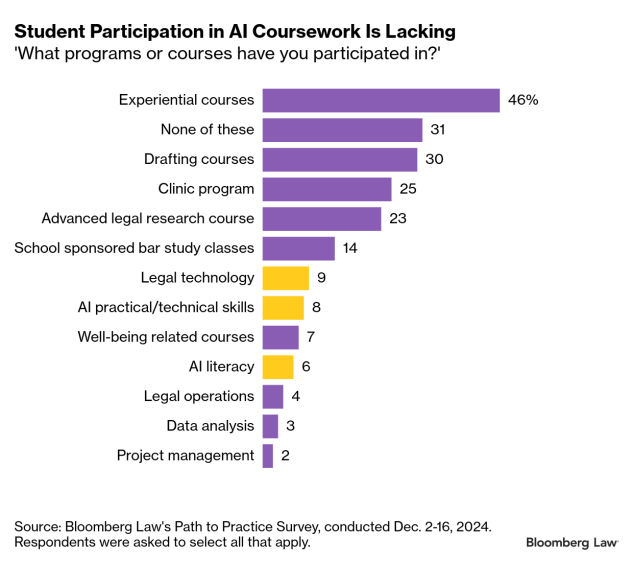As Bloomberg Law gears up for its annual outlook series for legal professionals, some of our analysts are revisiting their contributions to last year’s edition, Bloomberg Law 2025, to analyze whether their predictions for 2025 have found or missed the mark, and to discuss why. This analysis piece is the latest installment in our ongoing review. Bloomberg Law 2026 will be published in November.
The legal industry is investing in generative artificial intelligence, but are future lawyers going to be up to speed when they enter the workforce?
Last fall, I wrote that law schools would likely increase their teachings of generative AI and incorporate the technology into standard legal education due to industry demand, based on results from Bloomberg Law’s Path to Practice Survey conducted during the 2023-2024 school year. The survey results showed that law schools included AI in elective courses and other secondary programs, yet there was a lag in doctrinal or required coursework. I reasoned that we would begin to see more standardized AI courses based on industry demand.
But what has happened since? Based on more recent Path to Practice Survey results from the 2024-2025 school year, law schools responded to some of the demand we saw in the prior survey, but much less so than before, even as legal industry demand has increased.
Overwhelming Industry Demand
Although slightly more lawyers reported using generative AI for work tasks in the second Path to Practice survey (46%) than they did in the first one (40%), a vast majority still think that law students should be using the technology.
Almost 80% of the lawyers surveyed in the 2024–2025 school year (compared to 84% in the 2023–2024 school year) said that law students should be learning AI for at least one of the tasks listed in the chart below.
But are they?
Weaker Response from Law Schools
There’s a growing expectation that law students learn how to use AI, yet law schools aren’t meeting that demand, according to the survey data. In fact, there has been a large decrease in reported overall AI course offerings.
When asked about the types of AI coursework available to students at their law schools, 73% of law school faculty said their schools offer classes on the legal implications of technology, 70% said that classes on the basic understanding of AI are available, and 68% reported having classes concerning practical experience using AI tools for work. Nine percent said they weren’t sure and 2% responded “none.”
These numbers changed dramatically in the second survey. During the 2024-2025 school year, about half (51%) of law school faculty said that their schools offer classes on the legal implications of AI, followed by classes on the basic understanding of AI (44%) and the practical experience using AI tools for legal work (42%). (“Faculty” respondents include professors, librarians, and practicing attorneys who teach law students.)
Notably, almost one-third of the respondents said that they aren’t sure about what AI-related offerings their schools have, or that there are none.
Despite this drop, there’s one piece of hope to gather from the data. More respondents in the second survey realized that technological developments are relevant to their classes: 16% of faculty reported that tech developments weren’t relevant during the 2023-2024 school year, versus just 7% in the 2024-2025 school year.
Student Participation Is Low
While there has been a large decline in AI course offerings, law students are also not taking advantage of what is offered.
In the second survey, we asked law students what programs or courses they have participated in. Only 9% of student respondents said they participated in a legal technology course, 8% said they have taken an AI practical or technical skills course, and 6% reported that they have taken an AI literacy course.
Law students aren’t participating in these courses at rates expected based on AI’s use in the legal profession and on the reported overall availability of courses (even though there has been a decline).
The data show that the legal industry believes that law students must be educated on AI, and yet law schools aren’t increasing their AI course loads. Nor are students taking part in very high numbers. Law schools should continue to up their AI course offerings, especially in standardized courses, and students should be encouraged to participate.
While this data is slightly dated, law schools typically innovate at a slower pace. Given the advances being made with AI, there may be greater change in the 2025-2026 school year to prepare law students for the workforce.
Bloomberg Law subscribers can find related content on our Surveys, Reports & Data Analysis page and our In Focus: Artificial Intelligence resource.
If you’re reading this on the Bloomberg Terminal, please run BLAW OUT <GO> in order to access the hyperlinked content, or click here to view the web version of this article.
To contact the reporter on this story:
To contact the editor responsible for this story:
Learn more about Bloomberg Law or Log In to keep reading:
See Breaking News in Context
Bloomberg Law provides trusted coverage of current events enhanced with legal analysis.
Already a subscriber?
Log in to keep reading or access research tools and resources.



